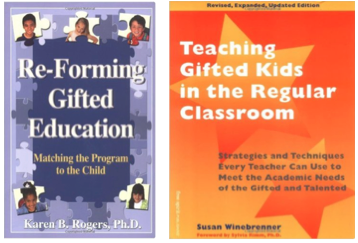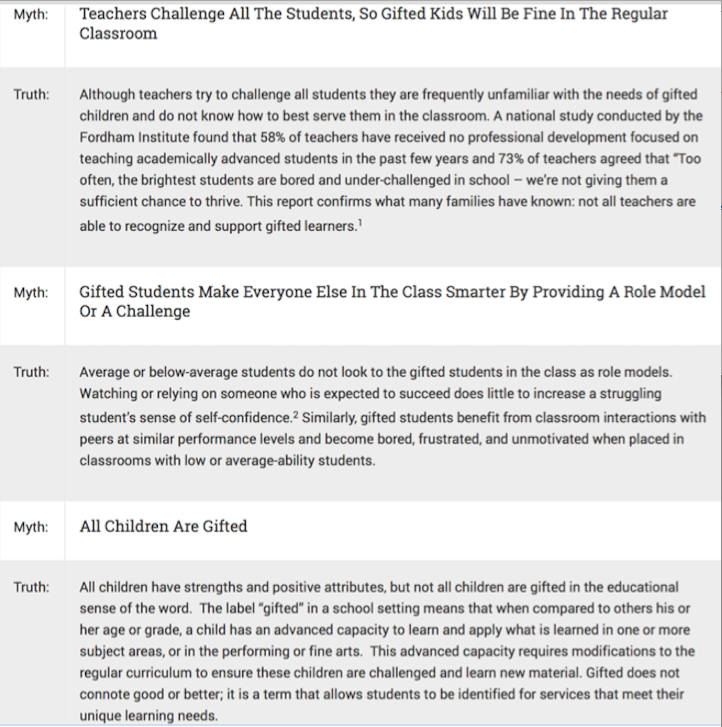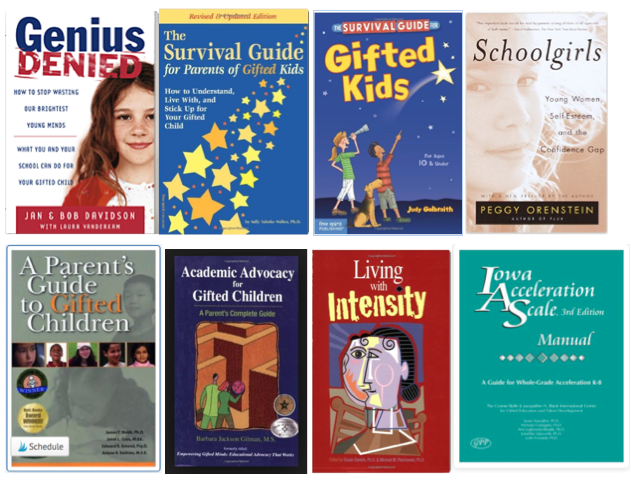Moni Ritchie Hadley
|
A discussion with mother/artist Kate Vrijmoet. Photo Credit: Barbara Noonan How would you describe the difference between a gifted student, a high achiever? and a high ability student? High achiever and highly-capable are coded language for the same thing. They’re all terms for gifted kids. They may have been developed because the word “gifted” is a culturally loaded word that alienates some people who make the assumption that the word suggests that one child is better than another. Using terms like high-ability, highly-capable and high achiever are ways to diffuse that, so that the kids who need services can get them. The stereotype of gifted people being more capable in all aspects is false. Often, the higher the I.Q. the greater the needs. This could be due to the prevalence of a secondary condition. These kids are called 2e or “twice exceptional.” That means they have high-ability concurrent with another special need such as dyslexia, dysgraphia, proprioceptive disorder, CAPD, severe food allergies, Asperger’s syndrome, etc. And, not all kids are gifted the same way. Some are gifted in a specific area such as spatial reasoning, art, movement, historical facts, reading. Also, I.Q. varies. In the gifted range they’re typically broken down into four categories of giftedness: moderately, highly, exceptionally, profoundly. Moderately and highly gifted students can be mainstreamed in the classroom environment if changes are made that differentiate or accommodate them. They may be highly-successful as adults. As students, they often navigate the school system easily. These are the kids most people think of when we use any of the terms that mean gifted. Kids in the exceptional category are those with I.Q.s in the 95th percentile and above. These kids have much higher needs. They’re more prone to dual-exceptionalities, social issues, anxiety and depression, and loss of interest.[1] Over the past decade I’ve read articles that claim this population has a higher than average dropout rate and, in the case of girls, a higher than average teenage pregnancy rate. They feel different and have a harder time fitting in. Both because of poor social skills and natural over-excitabilities, they sometimes exhibit behaviors that look like ADHD in the classroom. Profoundly gifted people are those who have I.Q.s in the 99th percentile and above. They appear rarely in the population (1/10,000 – 1/1,000,000). These kids can have a hard time because they do not fit into the school system the way it’s structured. They often don’t present as one might expect a gifted kid to present; they may not get good grades or appear engaged in the classroom. Many times they are not mainstreamed. Instead, their parents cobble together their education based on their needs and interests through home-schooling, private tutors, MOOCs, self-directed education, and college classes. There are wonderful organizations that help these kids and their families including The Davidson Institute and SENG (Supporting the Emotional Needs of the Gifted). In your experience, how are the students identified in the public school system? I’ve been a mom for 30 years and we have lived in many states including California, Oregon, Washington, New York, Massachusetts, and Florida. It’s different from state to state and even city to city. What seems to be a large problem in both public and private schools, is understanding how to identify these kids. The reason that’s a problem is because its not a requirement at schools of education that teachers in training to take even one college credit on identifying and teaching to giftedness. It’s often not hard to see if a kid is moderately or highly gifted. The problems and the kids at risk are the ones in the exceptional and profoundly gifted range, who perhaps have a dual exceptionality like dyslexia, which slows them down and masks their high-capabilities. In turn, their high-capabilities help them develop strategies for dealing with their dyslexia and thus obscured that need as well. So they end up very isolated and are neither identified for their abilities nor their disability. In some cases, students have undiagnosed special needs and have developed strategies to hide them, and seem to be underperforming.[2] There are some states that do a better job than others, in my experience. Oregon teachers, in general, have more rigorous requirements for certification and some are better able to differentiate for their students’ needs. Some states legislate both the requirement to identify this population and also fund their education. You can learn which states do this on the Genius Denied website. Here are a couple of books I recommend. As a mom, you've gone through the process with your own children. What difficulties did you face? I have two profoundly gifted children who are very different from each other. One is an introvert and the other an extrovert. One has a developmental disability that makes her processing extremely slow. One has 21 life-threatening food allergies, (Researchers haven’t yet pin-pointed why profound giftedness tracks so highly with food allergies). Dr. Nadia Webb’s research has shown that this group is physiologically different in that they have a larger number of neuro-connections. This highly-wired individual is often very sensitive to all sorts of things: clothing tags, foods, sounds, highly developed sense of social justice and more. When they’re engaged they can get very wound up, this is what Dabrowski’s over-excitabilities[3] refers to, and also why they can appear to have ADD or ADHD. What are the myths about gifted kids? There are many great sources that answer this question. One that both explains the myth and the truth is found on NAGC’s. Here’s an excerpt:[4] One “reason that these myths are perpetuated is that they can be true for some of the kids some of the time. The fact that a myth may be true for some gifted kids often makes it more difficult to debunk.”[5] According to Duke University, some common myths are:
Should gifted kids attend schools for the gifted, or should they be mainstreamed? I understand that inclusion classrooms are the educational fad right now because it seems politically correct, but research has shown that cluster grouping is a more effective educational model.[7] In Doctor Karen Rogers’ article Lessons Learned About Educating the Gifted and Talented: A Synthesis of the Research on Educational Practice She indicates several things idiosyncratic learners need: daily challenge in their specific areas of talent; regular opportunities to be unique and to work independently in their areas of passion and talent; various forms of subject-based and grade-based acceleration to as their educational needs require; opportunities to socialize and to learn with like-ability peers; differentiation in pace, amount of review and practice, and organization of content presentation.[8] What advice would you give other parents with gifted children? Giftedness is neither a cause for gloating nor embarrassment. It’s merely a special need that your child has. I sometimes I feel unable to adequately meet my kids needs. Some thing I’ve learned
Resource Links:
The Davidson Institute: http://www.davidsongifted.org/ SENG: http://sengifted.org/ SENG article library: http://sengifted.org/resources/resource-library/articles-library Genius Denied: http://www.davidsongifted.org/About-Us/Genius-Denied State by state education database: http://www.davidsongifted.org/Search-Database/entryType/3 Hoagie’s Gifted: www.hoagiesgifted.org Prufrock Press: http://www.prufrock.com/ Johns Hopkins Center for Talented Youth: http://cty.jhu.edu/ Eide Neurolearning Clinic: http://www.eideneurolearning.com/ 2e Newsletter: http://www.2enewsletter.com/ Smart Kids with Learning Disabilities: http://www.smartkidswithld.org [1] Reexamining Gifted Underachievement and Dropout Through the Lens of Student Engagement. Rebecca N. Landis and Amy L. Reschly. Journal for the Education of the Gifted, 36(2) 220 –249. 2013. http://s3.amazonaws.com/academia.edu.documents/39409224/Landis___Reschly_2013.pdf?AWSAccessKeyId=AKIAJ56TQJRTWSMTNPEA&Expires=1469399230&Signature=AmdY6Lfh8yJMV6PqtfP7JhSG5nk%3D&response-content-disposition=inline%3B%20filename%3DLandis_Reschly_2013.pdf [2] Critical Issues in the Identification of Gifted Students With Co-Existing Disabilities, The Twice-Exceptional. Barbara Jackson Gilman, Deirdre V. Lovecky, Kathi Kearney, Daniel B. Peters, John D. Wasserman, Linda Kreger Silverman, Michael G. Postma, Nancy M. Robinson, Edward R. Amend, Michelle Ryder-Schoeck, Patricia Hedges Curry, Sally K. Lyon, Karen B. Rogers, Linda E. Collins, Gerry M. Charlebois, Colleen M. Harsin, Sylvia B. Rimm. Published 29 September 2013. http://sgo.sagepub.com/content/3/3/2158244013505855?utm_campaign=G_ALL_F_2013&utm_medium=interest&utm_source=social_Facebook&utm_content=Newsletter_O&utm_term=All_disciplines [3] Overexcitability and the Gifted. Sharon Lind. The SENG Newsletter. 2001, 1(1) 3-6. http://sengifted.org/archives/articles/overexcitability-and-the-gifted [4] Myths about Gifted Students. NAGC website accessed 7/24/16 https://www.nagc.org/resources-publications/resources/myths-about-gifted-students [5] Myriad Myths about Giftedness. Duke Talent Identification Program 2015, Digest of Gifted Research, January 7, 2010. https://tip.duke.edu/node/934 [6] Ibid [7] Lessons Learned About Educating the Gifted and Talented: A Synthesis of the Research on Educational Practice, Karen B. Rogers, University of New South Wales, Gifted Child Quarterly, Volume 51 Number 4, Fall 2007 382-396, (http://gcq.sagepub.com) http://citeseerx.ist.psu.edu/viewdoc/download?doi=10.1.1.455.8897&rep=rep1&type=pdf [8] Ibid. [9] Is Your Child Gifted? What to Look for and Why You Should Know.... Psychology Today. David Palmer Ph.D. Posted May 01, 2011. https://www.psychologytoday.com/blog/gifted-kids/201105/is-your-child-gifted-what-look-and-why-you-should-know ***Special thanks to Jane Hesslein, Prufrock Press for peer review. Learn more about Kate Vrijmoet at www.katevrijmoet.com.
4 Comments
8/11/2016 10:11:05 am
What a great explanation of "gifted" children and different intellectual levels. This was a wonderful and needed article.
Reply
KG
10/28/2016 01:20:49 pm
The definitions of "levels of giftedness" are a little wacky in this article with percentages and occurrences in the population not matching what many of the popular resources (SENG, Hoagies, Davidson) have written up. Otherwise there's some great info here!
Reply
Frank Collette
7/25/2021 12:13:38 am
Levels of giftedness are merely arbitrary names given to an ascending or descending order of giftedness, I have no problem here.
Reply
Leave a Reply. |




 RSS Feed
RSS Feed
